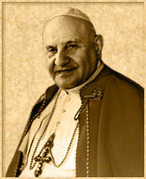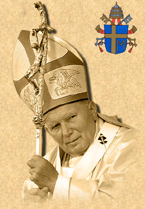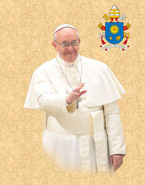On the one hand, there is pop music, which is certainly no longer supported by the people in the ancient sense (populus). It is aimed at the phenomenon of the masses, is industrially produced, and ultimately has to be described as a cult of the banal. “Rock”, on the other hand, is the expression of elemental passions, and at rock festivals it assumes a cultic character, a form of worship, in fact, in opposition to Christian worship. People are, so to speak, released from themselves by the experience of being part of a crowd and by the emotional shock of rhythm, noise, and special lighting effects. However, in the ecstasy of having all their defenses torn down, the participants sink, as it were, beneath the elemental force of the universe. The music of the Holy Spirit’s sober inebriation seems to have little chance when self has become a prison, the mind is a shackle, and breaking out from both appears as a true promise of redemption that can be tasted at least for a few moments. Commentary: For many, especially those inclined to a more "charismatic" flavour of devotion (although I contend that these have sorely misunderstood what it actually means to be charismatic, to begin with), the most appropriate music to be used in the liturgy is popular music, the music of the masses. Some, in trying to find their way around the mind of the Church, justify this preference in the name of "inculturation".
On the one hand, this betrays ignorance of the purpose of inculturation and the dialogue between the Church and cultures. On the other hand, it also ignores the objective reality that music is not neutral or simply a matter of subjective preference. One mistake made by many who argue for the "contemporary" flavour of the liturgy (and by "contemporary", I mean "popular") is their implicit assumption that music is neutral in its value and effect, and that as long as you infuse it with religious lyrics, it somehow becomes sacred. At the risk of sounding brash, this assumption sorely lacks logical intelligence. The Pope speaks in a detailed way, in the above-quoted paragraph, of how music is not neutral. Regardless of its lyrics, any form of music has a history from which it emerges, a purpose for its emergence, and a reason for it's continuation. If neither of these realities fit the dignity of the liturgy, it can neither be passed off as sacred music nor be judged fit for liturgical use. It would be rather lame to assume that the Holy Spirit could speak to us through the heavy thumping of much of contemporary music when in daily contexts, we would know that such heavy thumping would be non-conducive for the performance of any tasks which required concentration. For example, would you believe your child was studying in his room if what you heard emanating from that room all day was Michael Jackson blasting from his stereo set? Strangely, some people think the dignity of the liturgy could be preserved and the voice of the Spirit strongly heard when the same kind of music was used in the liturgy. St John Chrysostom said that the Church is a spiritual hospital. It follows then that everything - and ESPECIALLY her liturgy - must bring healing to the soul. Has anyone ever heard pop or rock music being blasted in hospitals that hope to help their patients recover faster with such music? "Popping" and "rocking" the liturgy of the Church is as daft as doing that.
1 Comment
28/7/2013 04:15:01 am
Dear Rev Mr Kuek,
Reply
Leave a Reply. |
Categories
All
Archives
December 2021
|
|
FOLLOW DEACON SHERMAN DEACON'S FORMATION FB GROUP
© 2021 Sherman Kuek. All rights reserved.
|

 RSS Feed
RSS Feed












